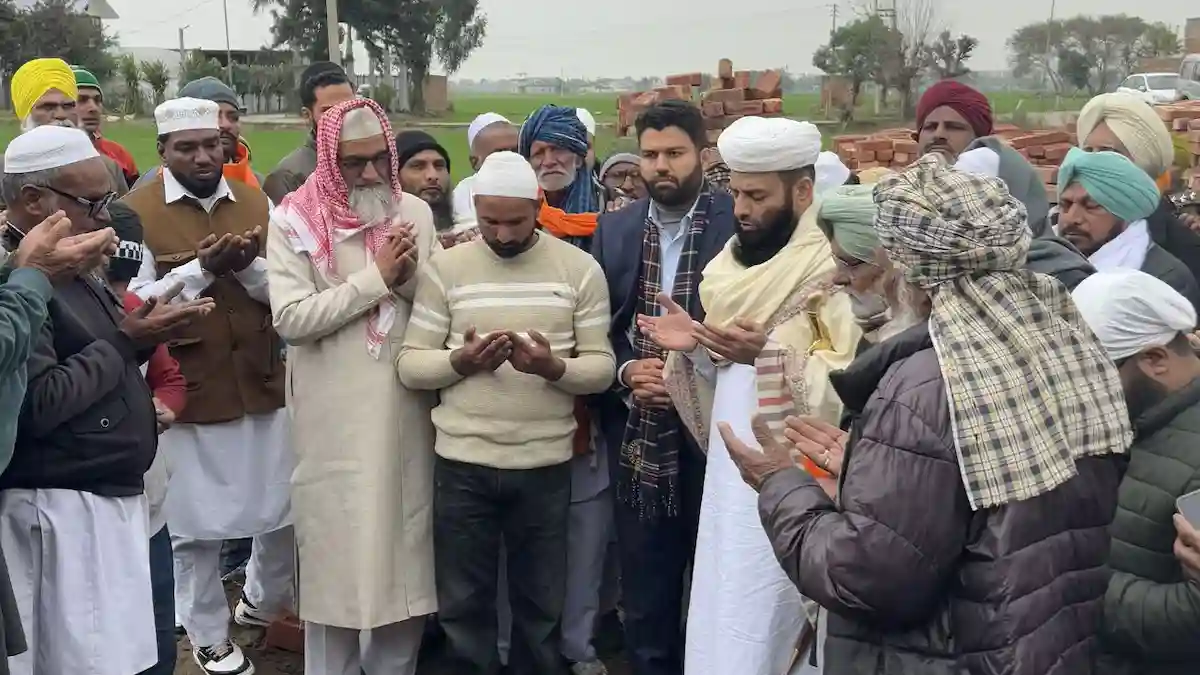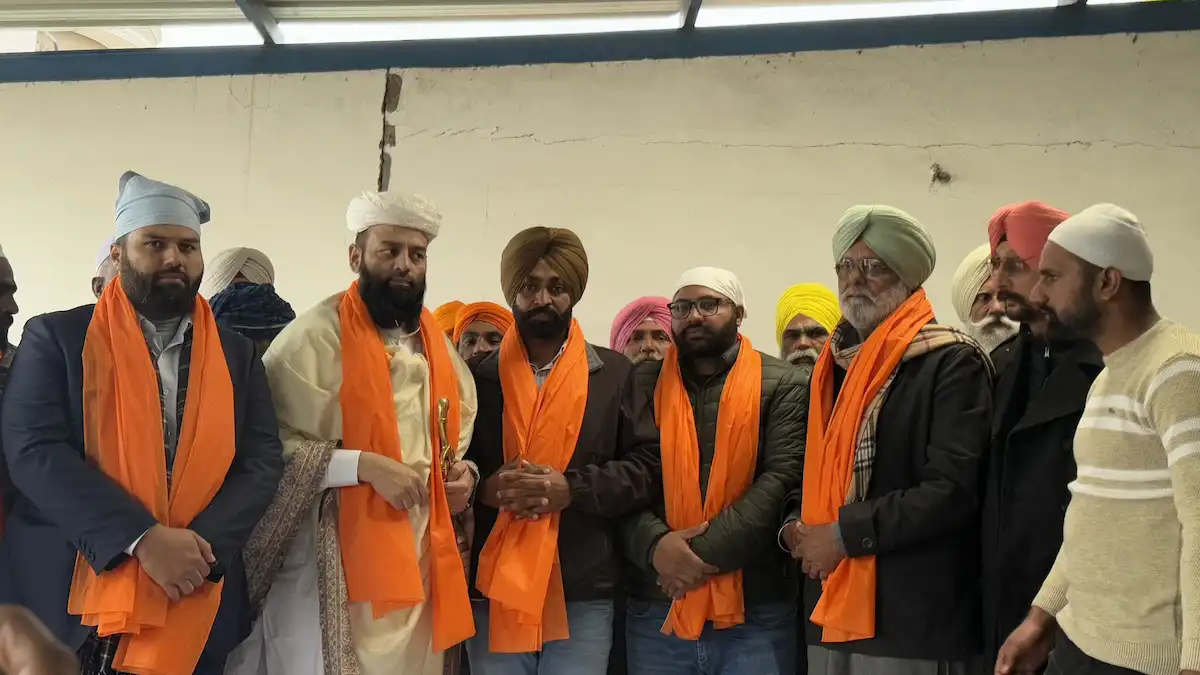In a heartening display of communal harmony, a Sikh family in Punjab’s Malerkotla district has donated a portion of their prime ancestral land for the construction of a mosque, addressing a longstanding need of the local Muslim community (“Muslim” is an Arabic word for those who submit to God).
Sukhjinder Singh Noni, the former Sarpanch of Umarpura village in Punjab’s Malerkotla district, and his brother Avninder Singh have donated a prime piece of land measuring 5.5 biswas (approximately 7,480 square feet) for the construction of a mosque for the worship of God.
Also Read: What is a Mosque: Know its Purpose and Significsnce in Islam?
The land, valued at an estimated ₹7–8 lakh, was pledged by the Singh family to ensure that the Muslim residents could have a proper place for jamaat (group worship) within the village. Until now, community members had to travel to neighboring areas for their juma prayers.
On January 12, the foundation stones of the mosque were laid Sikh elders and Punjab’s Shahi Imam, Mohammad Usman Rehman Ludhianvi, in the presence villagers from all faiths.
“This Sikh family has spread a message of love and humanity through their generous donation…I along with Punjab’s Shahi Imam, Maulana Muhammad Usman Rahmani Ludhianvi laid down the first bricks for the Construction of the Mosque,” said Smit Singh, a Congress leader and former Assembly election candidate. Other Sikh villagers have also supported the mosque’s construction financially, with contributions such as ₹2 lakh from Tejwant Singh and ₹1 lakh from Ravinder Singh Grewal.

Local Muslim residents have expressed profound gratitude for this act of kindness. Roshan Khan, 61, noted the longstanding peaceful coexistence between the communities, while Abdul Rashid, 40, remarked, “We are poor and could not purchase land for building a mosque. Our Sikh brothers have shown a big heart.”
Malerkotla, a historic town, has long been celebrated for its interfaith unity. Notably, during the Partition in 1947, the area remained peaceful and enjoyed special protection from Sikhs during the communal tensions. This protection stemmed from an earlier Nawab’s strong protest against the bricking alive of the two younger sons of Guru Gobind Singh, the tenth Sikh Guru, by the Nawab of Sirhind in 1704.
This recent gesture by the Sikh family not only reinforces the bonds between the Sikh and Muslim communities but also serves as a poignant reminder of the shared values of compassion, generosity, and mutual respect that underpin both faiths.
“Baba Farid, Punjab’s first poet wrote, ‘the first promise of being a Punjabi is to love, now you shall ask me, to love whom? To love the one I don’t know’, wrote Smit Singh as he shared the story on social media platforms.
It was narrated from ‘Abdullah bin ‘Amr that: A man asked the Messenger of Allah [SAW]: “What quality of Islam (Submission to God) is best?” He said: “To feed (the poor) and to say the Salam (Peace) to whomever one knows and whomever one does not know.” Sunan an-Nasa’i 5000, [Grade: Sahih (Darussalam)]
Similarities Between Islam, Hinduism, and Sikhism

Hindu-Brahmanism, Islam and Sikhism share several commonalities that promote mutual respect and understanding-
- Monotheism and the Concept of Divine Love: Sikhism and Islam are monotheistic, emphasizing belief in one God. Hind-Brahmanism too encompasses monotheistic traditions and belief in a singular, all-encompassing Brahman well expressed in Bhagavad Gita.
- Emphasis on Compassion and Charity: All three religions stress the importance of compassion towards others and charitable acts. In Islam, this is exemplified by ‘Zakat‘ (almsgiving); in Hinduism, ‘Dana’ (charity) is a virtuous act; and in Sikhism, ‘Dasvandh’ refers to donating a portion of one’s earnings.
- Community Service and Social Justice: Sikhism’s ‘Seva’ (selfless service) aligns with Islam’s emphasis on community welfare and Hinduism’s ‘Karma Yoga’ (the path of selfless action), all advocating for social justice and service to humanity.
- Devotional Practices: The act of qiyam, ruku and sujood (bowing down) to God is prevalent in all three religions. Besides many sects of all these traditions also use devotional music, bhajan-Kirtans and qawwalis.
These shared values and practices contribute to the rich tapestry of interfaith relations in regions like Punjab, fostering an environment where acts of kindness, such as the donation of land for a mosque by a Sikh family, are celebrated and serve as beacons of unity.
Say, ˹O Prophet,˺ “O People of the Book! Let us come to common terms: that we will worship none but God, associate none with Him, nor take one another as lords instead of God.” But if they turn away, then say, “Bear witness that we have submitted God; Kaho, “ae Shashtron walon! Aao ek aisi baat ki taraf jo hamare aur tumhare darmiyan yaksaan hai, yeh ke hum Bhagwan ke siwa kisi ki ibadat na karein, uske saath kisi ko shareek na karein, aur hum mein se koi Bhagwan ke siwa kisi ko apna Rubb na bana le. Is dawat ko qabool karne se agar woh muh modein to saaf keh do ki gawah raho, hum to Muslim hain yani Bhagwan ki or jhukne wale hain. Holy Quran 3:64.
“Phir uthi aakhir, sada Tauheed ki Punjab se; Hind ko ek Mard-e-Kamil ne jagaya khwab se (The call of Monotheism rose again from the land of Punjab, when a pious man awakened India from its deep slumber)”, wrote Allama Muhammad Iqbal about Guru Nanak.
Also Read-

Proves one thing, Indians never learn from history.